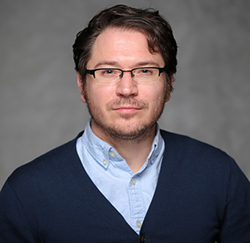Ancient Roman Graffiti: Cognitive and Social Dimensions of Religion
Friday, September 30, 2022
NOON – 1 p.m.
Please contact Dr. Antoinette Barffour with any questions.
Speaker
Dr. Bryan Brinkman, Assistant Professor of World Languages and Cultures and Global Studies, Missouri State University
Abstract
This work examines a particular class of religious graffiti from Pompeii and suggest the role these graffiti played in the creation of sacred space within ostensibly mundane public places. In doing this, I demonstrate how these informal writings challenge certain notions of the relationship between ex voto texts and sacred space. Beyond categories of “civic” or “household” as loci of devotional practices, these texts reveal how public space could be utilized as a site for votive performance. These behaviors are indicative of what Stanley Stowers refers to as the religious mode of “everyday social exchange” in which religious behaviors are aspects of the practical skills utilized on daily basis (Stowers, 2011). What is more, these inscribed prayers were often located in places with a high frequency of graffiti. I suggest that the inscribing of a graffito in one of these locations was likely viewed as an efficacious means of producing dialogue, given the inherent dialogic function of public graffiti (Benefiel, 2010). As such, the graffito was seen as an appropriate medium through which to communicate with divinities who, like other inhabitants of the city, had access to the “public forum” afforded by these texts. These graffiti prayers illuminate certain religious practices that are otherwise difficult to identify as well as the spaces within which those practices took place.
Misunderstanding Language as a Commodity from a Marxist Perspective
Tuesday, October 25, 2022
NOON – 1 p.m.
Please contact Dr. Antoinette Barffour with any questions.
Speaker
Dr. John Petrovic, Professor and Program Coordinator of the Department of Education Leadership, Policy and Technology, The University of Alabama
Abstract
A lot of recent literature considers the so-called commodification of language. While many authors cite Marx in this vein, there is little engagement with Marxist theory. This leads to misreadings of the commodity form and concomitant notions such as appropriation and dispossession. From a Marxist lens, it seems that language can be subject to neither process, and applied linguists should turn to more productive analytical lenses such as Bourdieuan notions of capital (although, this too, derives from Marx) or racio-linguistics.
The Missouri State University Linguistics Colloquium Series is sponsored by the Missouri State University Linguistics Program.
